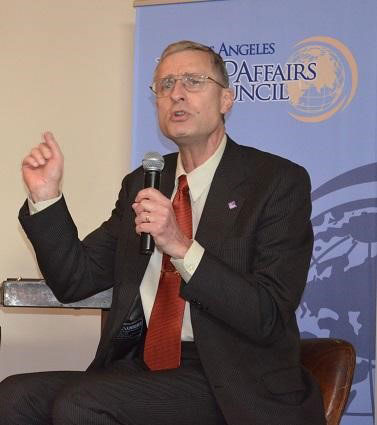
Bruce Bennett, RAND North Korea expert
When North Korea detonated a nuclear device in January of this year, and then the following month launched a rocket that outsiders described as a potential ballistic missile, there was widespread condemnation - and ultimately the UN Security Council passed a resolution implementing sanctions against North Korea. But according to Bruce Bennett, an expert on North Korea from the RAND Corporation, the government in North Korea is undeterred in its aggressive stance, because much of what they are doing is for domestic consumption - their actions have to be seen from the perspective of a young, insecure dictator trying to consolidate his power at home. And with a rare party congress coming up in May, there is added incentive for the inexperienced Kim to be seen standing tough against North Korea's perceived "enemies". With the 1.4 million soldiers of North Korea facing 600,000 combined South Korean and US forces across the DMZ, all on a hair-trigger alert, the potential for miscalculations or overreactions spiraling quickly into some form of devastating conflict are very real. "If anything ever happens - and lots could happen, we could be in big trouble," said Bennett.
North Korea leader Kim Jong-un is "brutal and repressive" with a regime comprised of "failures built on failures" said Bruce Bennett, senior defense analyst at RAND. Bennett spoke at a Los Angeles World Affairs Global Café breakfast meeting on Friday, March 11th. He said North Korea and China "pretty much hate each other", that if Kim loses he will "destroy the earth", and that the US needs to be more inventive about our nuclear strategy or we "could be in big trouble."
Kim Jong-un comes from a line of brutal dictators. "Like father like son," said Bennett. Not much is known about Kim. "We know about him being in Europe in his early to mid-teens. We have some pictures of him in that period. Jump forward ahead over a 10-12 year period, we have not even a picture of him." He is the third son of Kim Jong-il, therefore was "not the likely successor". However, his oldest brother was ruled out after trying to use a forged foreign passport to try to get into Tokyo Disneyland. His other brother is "reportedly effeminate and not much of a leader."
Because he was not initially seen as the successor to his father, Kim Jong-un's accession to power was relatively abrupt: "Kim Jong-il had thirty years to prepare for when he took over. Kim Jong-un had two," said Bennett. "And that makes a huge difference. He has been brutal since." Kim has repeatedly purged top officials - he has changed the defense minister five times in four years. The chief of the general staff has been changed four times. He even had his uncle executed. "He is a 30-year-old in a society that reveres age and experience," said Bennett, "and so he's got some real problems and he is trying to purge out the older generation." The mindset in North Korea is that "Kim Jong-un is not a leader, he's a god." "He has almost nothing that he can put in his success column - except for nuclear weapons."
On North Korea's current nuclear capabilities, "the number one objective in North Korea is regime survival. It's kind of like a mafia family, think of it that way," said Bennett. "They want to stay in charge, they want to stay in control. That's their major objective." North Korea does not produce enough food to feed their people, they are dependent on imports, their industry is dilapidated. But they saw how the US held the far more numerically stronger Soviet forces at bay in Europe during the Cold War because of the US nuclear deterrent, and the North Koreans think they can similarly use nuclear weapons to stay in power. North Korea is one of just 9 countries in the world that has nuclear weapons and they've been developing their nuclear industry since the 1960s - initially with Soviet help, and subsequently on their own. Their first nuclear test was in 2006, and there have been three more since then.
 LAWAC Global Café breakfast discussion wit Bruce Bennett
LAWAC Global Café breakfast discussion wit Bruce BennettOn the relationship of North Korea and China, Bennett said, the "Chinese are pretty angry at North Korea now...Both sides are very nationalistic and they pretty much hate each other. But it's a marriage of convenience." At the same time the South Koreans, who had built up a close relationship with Beijing, are also now furious at China, saying they feel betrayed by Beijing for not doing more to reel in the North Koreans.
On unification, Bennett said China may well support a peaceful unification, which is South Korea's objective too, but the Chinese would not want to see US troops moving north towards the Chinese border. Should North Korea collapse, Bennett thinks there is a good chance that as South Korean forces move north, Chinese forces might cross the border and move south. "China is not excited about a US presence in North Korea."
On hacking, Bennett said, "They are looking for hackers at the first grade level." North Korea recruits about 1,000 students a year to be trained in cyberattacks, and they now have a total of some 6,000 - "they appear to be pretty good," he said, pointing to the attack on Sony Studios. He said many of their hackers are based in China because the open internet is only available in select places in North Korea.
With US-South Korean military exercises going on at the moment, the North Korean leader has threatened to carry out a preemptive nuclear strike on his foes to the south. When asked if this was just a bluff, or if he might seriously be considering an attack, Bennett said one cannot rule out the possibility that Kim might do the unthinkable. "Our official doctrine is we will not use nuclear weapons against civilian populations - we will only use them if the US faces an existential threat." So Bennett thinks that the North Koreans might calculate - rightly or wrongly - that an attack on South Koreans might not be seen as serious enough to provoke the US into a nuclear exchange. This means that possibly "Kim is thinking he might be able to get away with it." Of course nobody really knows what is going on inside the government of North Korea, but even the possibility that an endangered and inexperienced dictator might reach for the nuclear button is enough to keep many other countries, including the US and China, on a very nervous footing.
